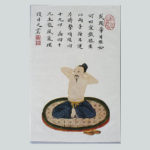
5 reasons for a massage therapist to study channel theory
The channel system is the cornerstone of Chinese medicine. It was developed over 2000 years ago and recorded in a book called the Yellow Emperors Inner Classic (黃帝內經 huáng dì nèi jīng). Channel theory is most often associated with acupuncture, but it is also of great value to massage therapists and manual therapists of any kind. Here are five ways to think about this.
1. Channel theory connects us to the knowledge base of an ancient natural science
Until recent times in the West it was assumed that the channels have no anatomical basis and were “discovered” through some esoteric process of mystical experience. This is simply not true. In fact, the channel system was developed over a long period of time through the efforts of a great many people working together in various fields of natural science. The channels are rooted in a rigorous study of anatomy and physiology whose insights are still valid today.
For us modern people studying the channel system opens the door to look at how these ancient scientists developed a model of health and illness that works side by side with modern science. The ancient knowledge and the modern knowledge complement each other and address each other’s weaknesses.
2. Channel theory makes sense of experience
Modern medical science is full of marvellous technology and is a treasure trove of accumulated information about the functioning of the body. But it does not interface with our lived experience very directly. The blood work your MD does may reveal the state of your liver enzymes, but you will never directly feel these enzymes for yourself.
In contrast channel theory was developed entirely through observations made with our own human senses. Thus, everything is described in ways that can be directly felt and experienced by both the therapist and the patient. For the therapist this means that the many complicated variables of each individuals presentation can be sorted into an understandable and actionable format. For the patient this opens the way to being engaged with the processes of her or his own health, wellness and recovery from illness. For both therapist and patient channel theory connects our own individual experience inside our bodies to the larger experience of being connected to the world around us.
3. Channel theory is low tech
Because the channel theory is based entirely on the observations made by people with their own senses it is inherently low tech. The knowledge base of channel theory is easy to acquire and easy to begin applying. Even at the beginning of study many common ailments can be successfully addressed with no more than our hands and a few simple tools (tools such as moxa, hot packs, herbal poultices for example). When skill has been developed to a high level simply identifying how the circulatory homeostasis has been disrupted and reinstating the proper circulations in the channel system is enough to address even very serious illnesses without recourse to high tech drugs or procedures.
4. Channel theory is beautiful
The basis of channel theory is a rigorous study of the circulation patterns not only of the human body but of all creation as we move together through time and space. The earth orbits the sun, the moon circles the earth, the sun moves through the void around a galactic center. In our biosphere water falls as rain and raises again as clouds, the oceans swirl, the winter freezes the springtime melts. All creatures push up from the ground towards the sky. How we fit into this greater picture, how to understand the cycles of change around us and how to harmonize with them are ultimately the lessons contained in the study of channels.
5. Channel theory works
At the end of the day Chinese medicine and channel theory have been around for more than 2000 years because it works. Despite the many challenges of crossing linguist and cultural barriers, of encountering bigotry and being shuffled aside as quackery, channel theory has always risen to the ultimate challenge and the only one that really counts, in clinic it works. Anyone who takes the time to sit with an open mind and look for the channels and their use for even a short time will quickly come to appreciate them and the treasure that channel theory is.
At the Montreal Gongfu Research Center our approach to the study of channel theory is both didactic and practical. Our theory classes are based on an ongoing study of the ancient classics while the channels themselves are studied through a combination of qigong exercises, the hands on development of palpatory skills and an examination of anatomy and physiology.
To know the next date for the Chanel Theory Seminar, click here.
Montreal Gongfu Research Center
www.montrealgongfu.com


